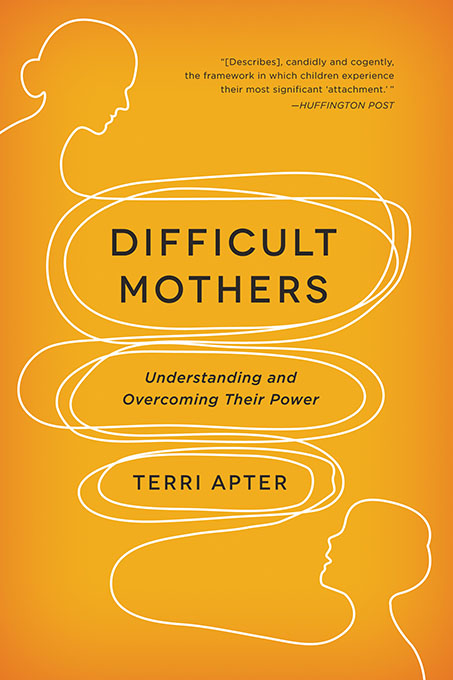
ALSO BY TERRI APTER
What Do You Want from Me?
The Sister Knot: Why We Fight, Why Were Jealous, and
Why Well Love Each Other No Matter What
You Dont Really Know Me: Why Mothers and
Daughters Fight and How Both Can Win
The Confident Child:
Raising Children to Believe in Themselves
Secret Paths:
Women in the New Midlife
Best Friends: The Perils and Pleasures of
Girls and Womens Friendships (coauthor, Ruthellen Josselson)
Altered Loves:
Mothers and Daughters During Adolescence
Working Women Dont Have Wives:
Professional Success in the 1990s
The Myth of Maturity:
What Teenagers Need from Parents to Become Adults
DIFFICULT MOTHERS
UNDERSTANDING AND
OVERCOMING THEIR POWER

Terri Apter
W. W. NORTON & COMPANY  NEW YORK LONDON
NEW YORK LONDON
Contents
Introduction
I T COMES without warning. I turn my gaze out my office window, anticipating one of those exquisitely private moments when memories and long-term musings sweep away the deliberations of the day. Instead, I suddenly chill to memories of my mothers angry breath and feel its rhythm in my own heartbeat. My enjoyment of the glowing college gardens and the unexpected peacefulness in my workday afternoon is broken by a sudden storm of accusation and derision. My mother has been dead for many years, and in that time I have come to cherish a family of my own and face largely pleasant professional challenges in my adult life, but her critical, suspicious, probing presence is a constant companion.
I count myself not merely a survivor but also someone who has had some benefit from the puzzles and paradoxes of that difficult relationship. In the course of my research for this book, I learned that many people develop skills such as tolerance, diplomacy, compassion, and patience from a difficult relationship with their mother; but for many, too, the impact is devastating. They persist in seeing themselves as the child who could not secure comfort with the most important person in their life. Love, attachment, and closeness are packed with the dangers of constraint, humiliation, and despair. While these past experiences may contain the gold of creativity and may provide a source of energy, imagination, and intelligence, they leave us perplexed, angry, and uncertain. This book offers a framework for understanding what sometimes goes wrong in one of the most formative relationships of our lives and why the effects of this difficulty linger. Psychological science shows why our past difficulties continue to shape our present lives. This science also offers tools to reshape our responses and maintain our resilience.
I wrote for P sychology Today in which I outlined common patterns of the uncommon experience of a difficult mother. The responses that flooded in by letter and email stunned me. I thought I was describing a few outlying cases, but I soon realized the theme had a wide resonance. Men and women in their teens, in early adulthood, in middle age, and in their senior years said they could now begin to understand their difficult relationships. They expressed relief that it was not just them and that the fault was not all theirs. They felt liberated from an ancient shame. For me, too, there was relief and pleasure in having finally written on a subject that has engaged my thought and attention for many years, but which I had supposed was of limited interest, a matter of rare exception only.
Not all the responses were positive. A longtime friend and valued colleague said that though she found the article useful in her clinical practice, she was wary of the subject.
Talking about difficult mothers is dangerous, she explained. Everyone blames mothers for everything. If you focus on difficult mothers, you ignore a mothers perspective.
Anyone approaching the heated topic of difficult mothers would be wise to heed my brilliant colleagues warning. Difficult mothers is a dangerous topic. First, it threatens to disturb the ideal of mother love that is the foundation of parenting models in psychology, in society, and in politics. Common sayings trip off the tongue to waylay the unease so often felt when confronting this topic: You only have one mother. She does her best. You know she loves you. These words bury the uneasy subject. The message is: You should concentrate on what is good in this relationship and You cannot publicly challenge the maternal ideal. In other words, it is better to comply with the relational dilemma imposed by a difficult mother than to articulate the paradoxical feelings that plague you. To this charge, I argue that the cultural pressure to deny complex and unpleasant thoughts and emotions should be resisted. This resistance is a fundamental task not only of the psychologist but of every person who wants to feel whole.
The second objection is that any mention of difficult mothers can be perceived as an attempt to denigrate all mothers. This objection is really a mirror image of the first. Whatever is idealized is always at risk of being denigrated or demonized. When mothers are idealized, the real mother is at risk of appearing to be a bad mother. The ideal mother is always patient, loving, and responsive. She is perfectly attuned to the needs of others and indifferent to her own. Does difficult mother refer to a mother who simply does not meet an unrealistic ideal?
The answer is no. I emphasize the importance of maternal responsiveness, both in infancy and throughout a persons development, but sufficient responsiveness is very different from perfect responsiveness. After all, children have evolved to thrive with a parent who has a normal range of rough edges, limitations, and imperfections. Instead of good versus bad mother, I use , and she reveals her diverse humanity to her child.
The third reason difficult mother is a dangerous topic is that it seems to objectively justify a sons or daughters criticism. Clinical psychologists often hear complaints about a mother and build up, consistently and over a long period of time, a picture of someone who is vindictive, depressed, hostile, or cold. Yet, if they happen to meet her, they search in vain for a living model of the portrait their patient has meticulously drawn. Instead of the vindictive, or depressed, or cold woman, they may find someone quite different. She may be thoughtful and reticent, but open and responsive rather than depressed. Or she may seem quietly joyous, deeply calm. Ruthellen Josselson writes about her habit of grouchily challenging therapists when they present a case in which a client is described as having an angry, controlling, narcissistic, envious, or emotionally neglectful mother. You mean, she corrects, .
It is those powerful experiences I describe. The way a son or daughter interacts with a mother, the way he or she perceives a mother, may be very different from another persons more objective account. Experiences are no less real or less compelling because they are subjective.
A fourth danger in exploring the subject of difficult mothers is that of appearing to add to the already endless list of instructions about how to be a good mother. Over the past hundred years, mothers have been bombarded with expert opinions on their parenting behavior. A book about difficult mothers risks appearing to offer further reminders to mothers of the harm they might do their child if they do not mother according to specific guidelines.
This book does not offer a list of what to do and what to avoid. Instead, it looks at two people in a powerful life-shaping relationship and describes the framework in which some people (about 20 percent of us) experience a mother as difficult. Their specific contexts and individual experiences are beyond the reach of broad generalizations. Some children have the genetic makeup of a hardy dandelion and are able to grow in rough conditions. , whose special sensitivities create special vulnerability. Difficult mother is not a simple definition. The term can be seen as shorthand for other terms I use, such as difficult relationship or difficult relational environment. In that context I ask, How does a mothers persistent criticism, resentment, neglect, rigidity, or volatility shape some childrens minds and emotions? I ask, What are key differences between healthy conflicts and irritations, on the one hand, and, on the other, intractable patterns of conflict and tension that distort and constrain an entire relationship? I describe how key experiences or events and words and actions come to build internal models for a sons or daughters interpersonal world.
Next page

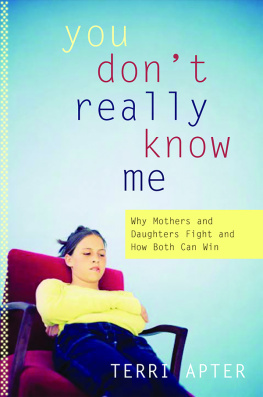
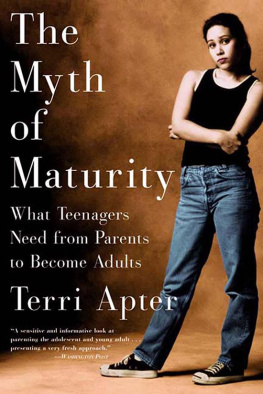
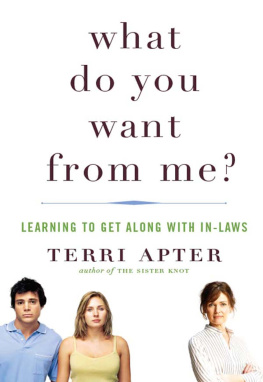
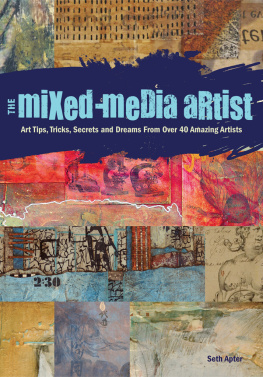
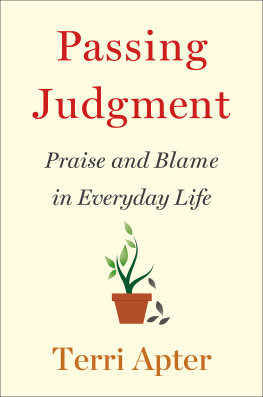
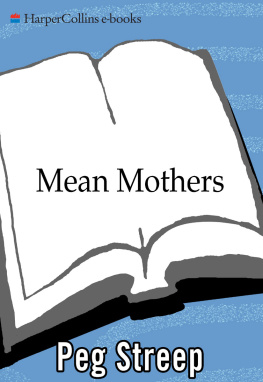
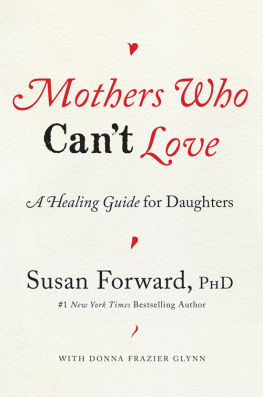
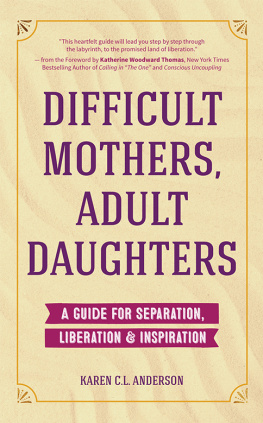
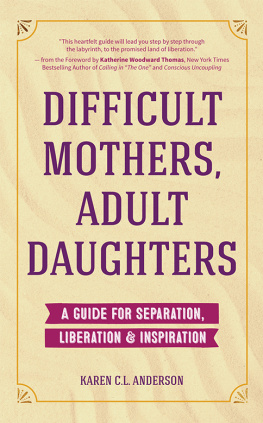
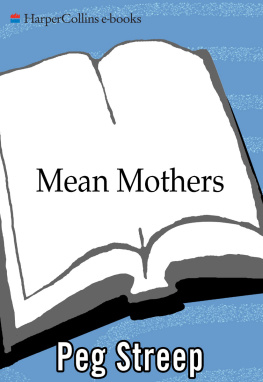


 NEW YORK LONDON
NEW YORK LONDON